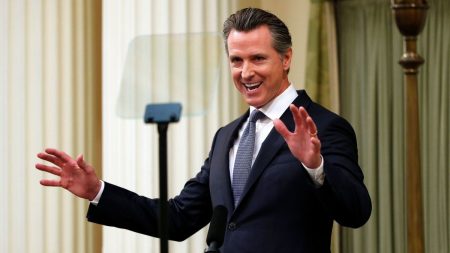February 13, 2019 – In his state-of-the-state speech this week, newly elected California Governor Gavin Newsom talked about putting a value on the data we share online. He called it a “digital dividend.” Here is a quote from his speech:
“California’s consumers should also be able to share in the wealth that is created from their data. And so I’ve asked my team to develop a proposal for a new Data Dividend for Californians because we recognize that your data has value and it belongs to you.”
A mere two lines in a 45-plus minute speech, it represents an interesting notion. What would this digital dividend look like?
The term “digital dividend” is traditionally used in association with broadcasting, particularly the radio spectrum associated with television broadcasts. But that’s not what Governor Newsom is talking about. His “digital dividend” would be paid back to those of us who put our data on social media and other websites, that contribute to the income of big tech firms like Alphabet, Facebook, Amazon, Apple, and others. Alphabet alone made $30 billion in profit last year, and Facebook earned $22 billion.
In calling for payback to users of the online products that these companies give to consumers for free, just what could the Governor have in mind?
In an article appearing in The Boston Globe on June 14, 2018, David Scharfenberg writes, “We all work for Mark Zuckerberg.” He goes on stating, “we are the grunts who have built Facebook’s online empire — and Google’s, too, our clicks and posts feeding detailed psychometric profiles the Internet giants sell to advertisers for huge sums of money.” The companies would argue that in effect we are being paid since we get to use their intellectual property for free. But without the data and participation of consumers, Alphabet and Facebook would have nothing.
In a book entitled, “Radical Markets: Uprooting Capitalism and Democracy for a Just Society,” authors Eric Posner and E. Glen Weyl, have estimated that as Alphabet, Facebook, and others technology giants fully implement the artificial intelligence economy of the near future, our data should have value. After all, we may all be out of work. Posner and Weyl estimate a family of four should be paid $20,000 per year for their participation online. It certainly doesn’t make up for the loss of jobs to automation, but it could be a reasonable supplement to any family budget.
When you think about it, we have been living through multiple ages of undervalued work. Just think of the old family model where the husband was the breadwinner, and the wife stayed home to raise the kids and manage the household. Homemaker didn’t earn a dividend, let alone a digital one.
In a July 2018 issue of The Economist, it refers to “data slavery,” a term that denotes how consumers hand over intimate information to technology companies. The article describes how Jennifer Lyn Morone, an artist, has registered as a company in Delaware to “exploit her personal data for financial gain.” The sum extent of her online value she listed at approximately $9,000 USD.
The term artificial intelligence when it comes to personal data is really referring to collective intelligence brought about by the algorithms that Alphabet, Facebook, and others create which mine and process what we feed them. Without reams of data, machine learning knows nothing. Without lots of examples to process, algorithms can do very little to predict future trends and outcomes. Take for example the algorithms behind what makes autonomous vehicles possible. These pieces of software, that direct a self-driving car, learn from human input. Without hundreds of thousands of data inputs, a self-driving car couldn’t steer its way through an intersection, let alone go for a long highway trip.
In their book, Posner and Weyl suggest the need for a data labour union, an organization that becomes the gatekeeper for consumer data, creating a rate sheet for every piece of information we put into these online presences. It would be interesting to see what would happen if consumers were to go on strike withholding data from Alphabet, Facebook Amazon, Apple, Twitter, and others. I doubt these companies would survive.
So Governor Newsom has raised an interesting issue that could be as revolutionary as both parents working was to the old model of the family from the 1950s.









